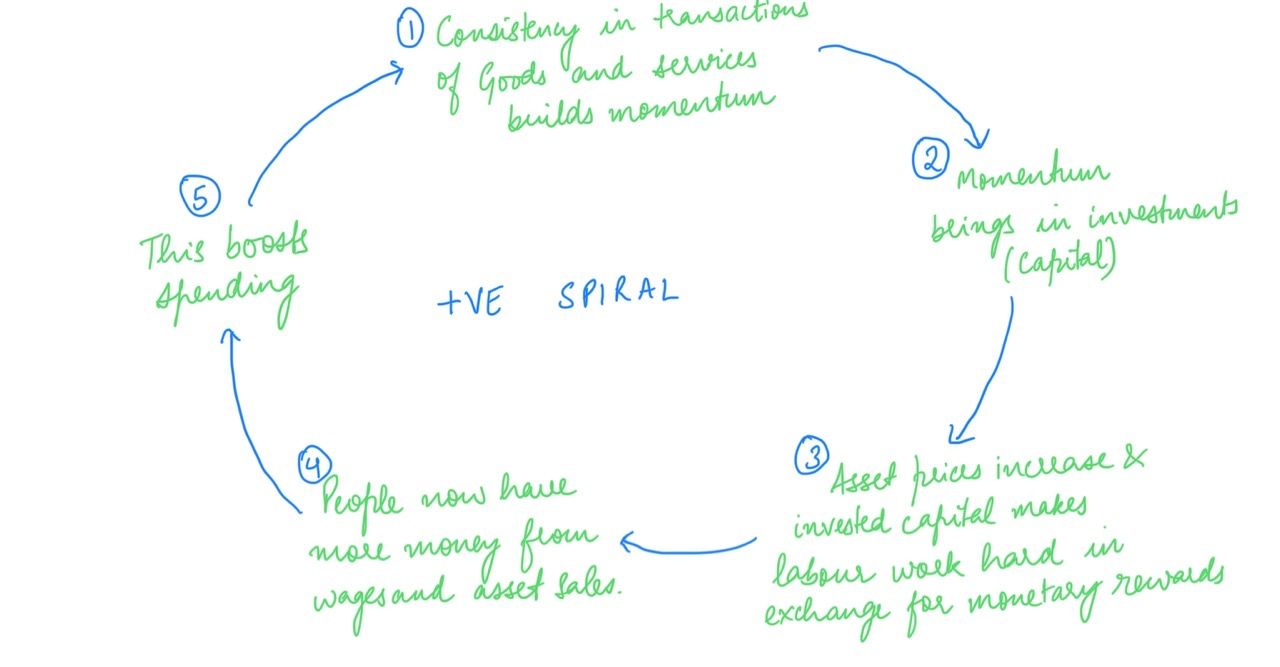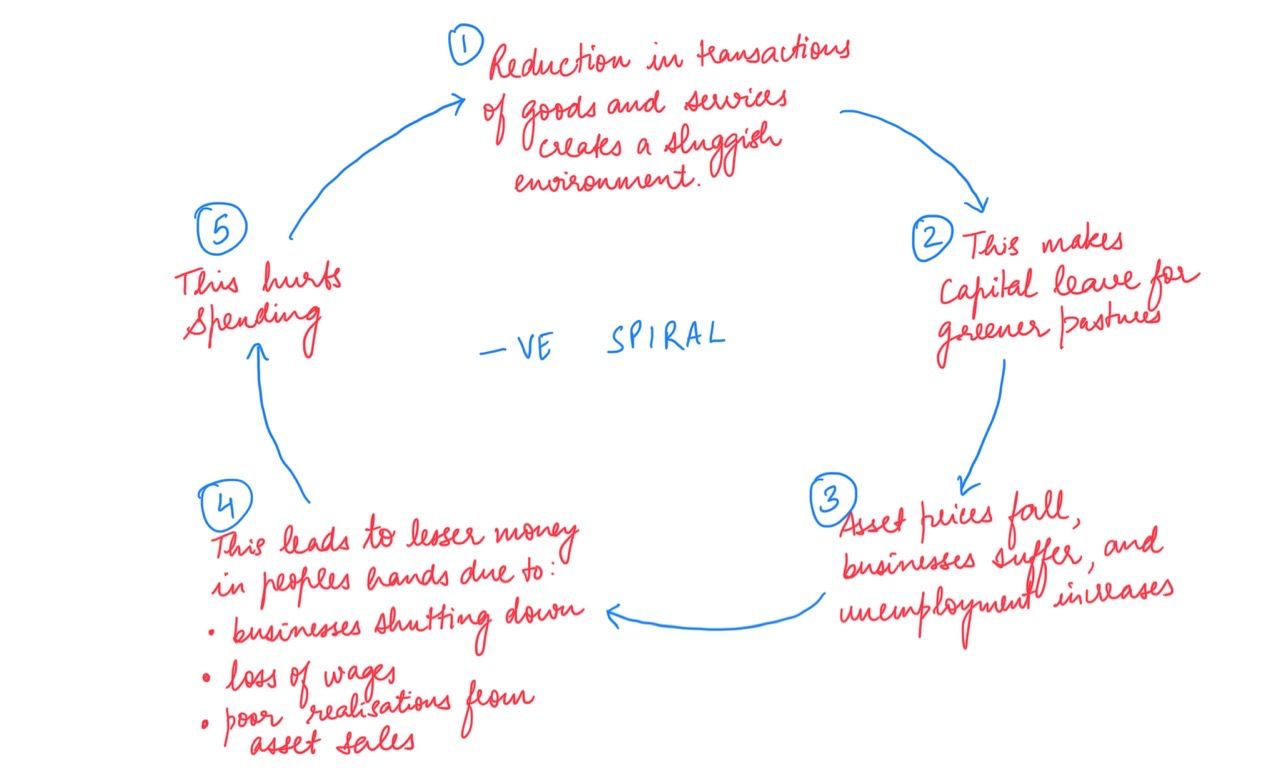Turning The Economy Around

Table of Contents
Last week, the Ministry of Statistics & Programme Implementation, published a report stating India's economic numbers for the April-June Quarter of 2020. The finding which made the headlines everywhere was - "India's GDP contracted by 23.9% in the April to June Quarter of 2020".
This means, if India's GDP in the April to June quarter of 2019 was ₹ 100, it reduced to ₹ 76.10 during the same period in 2020.
GDP (Gross Domestic Product) is the total value of all the goods and services produced in a country / region during a period.
As you would've guessed, I had many questions and wanted to learn more. In this article, I'm sharing my learning in the following format -
The Nature of Economic Cycles
Let's compare it to running:
- If you run everyday ⇒ you build stamina ⇒ now, you can run for longer and faster.
- But, when you stop running ⇒ your stamina depletes ⇒ now, even running a short distance becomes difficult.
It's the same for an economy. The images below depict what upward (+ve) and downward (-ve) economic cycles look like.


Same as with stamina, the longer the practice persists, the stronger the cycle becomes. Building it is gradual, but it can fall suddenly.
To understand the economy and financial crisis in more detail (yet, simply :)) please check this post out.
How To Find Growth Again
When stuck in a downward economic cycle, the singular focus of policy makers is to find ways to boost spending.
To do that, someone has to take the initiative to spend big. Such an investment creates jobs and puts money in the hands of the people who further spend on goods and services, and hence this 'stimulus' starts to move the economy. Usually, projects at such scale can only be undertaken by the government.
To understand this better, let's assume that the government is Amazon!
Now say Amazon is short of funds, and needs more money to run its business operations. How can it get more money? What are its options?
- Charge more - Amazon's business is to take a small cut on every transaction that happens between buyers and sellers on its platform. By increasing this cut, Amazon risks alienating both buyers and sellers. Since this leads to higher prices for buyers, or lesser profits for sellers, or both.
This is like the government increasing taxes. Amazon may still be able to pull this off due to its might, but it's much harder for the government (since their job is to keep everyone happy, or at least the majority). The government's job is to ensure the welfare of the people. And in a situation where the public is already cash-strapped, increasing taxes is super-difficult. - Take loans - For Amazon to take more loans, it would first have to consider its current borrowings, and its ability to repay them. Taking loans without a viable plan of paying it off is a recipe for disaster.
India's debt to GDP is already ~ 70%. And is expected to increase further due to COVID-19. This means that the government's borrowing already stands at ₹ 70 for every ₹ 100 of goods and services produced in the country (which is not even the government's revenue; the revenue is the tax levied on these transactions and on incomes). Borrowing more at this stage is very risky, although it may end up being unavoidable. - Sell assets - Say Amazon owns equity shares of other businesses, which are unrelated to its core operations. Selling these shares can give Amazon much needed liquidity to weather the storm it is facing.
The government is exploring such opportunities of divesting from public sector enterprises. This in my opinion is the best route for raising funds. One would like to see the government make astute choices about what to divest from and what to continue holding ownership in. Only time will tell. - Schemes to partner with others - Say Amazon has not been able to get a very popular brand on its platform. If it were to make an offer saying - "if you start selling on Amazon, and we won't charge our cut for 5 years." This would make Amazon's customers happier, and the seller would get access to Amazon's audience. But, Amazon needs to make a special plan to facilitate this.
The big guns of the private sector have deep pockets. Encouraging them to take initiatives that would boost the economy, through tax incentives and regulatory pass-throughs, would go a long way in boosting investments and spending on the ground. - Printing money - Amazon could boost spending on its site by giving it's prime customers wallet credits, and making the sellers accept these as a viable form of payment. But this would not be real.
Since America started printing money in 2008, it's become fashionable to suggest that every other country should follow suit. I strongly disagree. Considering India's economic situation, printing money isn't feasible. It would lead to inflation, and further devalue the Indian Rupee.
For me, printing money is a no-no. Increase in taxes should be the last resort. Short term loans can be explored to meet immediate requirements, but these need to be paid off quickly. Schemes to partner with the private sector (domestic and foreign) should be a priority, but to mobilise people to take up any economic activity, till coronavirus recedes, is tough. And finally, the best way forward seems to sell equity stakes held in public sector enterprises.
In the short to medium term, I think our policy makers have their work cut out. And how they perform during this period will be critical to our country's future. In the long run though, India will definitely thrive! We Indians are an aspirational race, and I'm very optimistic about the future.
Some Musings On Government And Society
Learning about this topic made me think about society and the role of the government. Sharing my thoughts here :)
Society is supposed to take care of itself, economically. Looking out for their self-interest in every transaction. This attaches a selfish goal to every task performed.
But, Government is tasked with welfare, which is the opposite of an economic pursuit. However, it can only be delivered through economic resources. So governments too, need economic muscle. Alongside that, governments are entrusted with enacting policies to support the economic interests of individuals and organisations.
This dynamic seems flawed on a logical level!
Everyone in society is expected to have an exclusive agenda of self-interest, but the government is supposed to have the inclusive agenda of welfare, while keeping everyone on board with their decisions, and earning substantial economic resources.
This modern economic setting has led to accumulation of riches in the hands of a few, and an unrelenting desire to acquire more of it... on the part of each member of society. And depleting economic resources for performing welfare, coupled with increased dependence on the rich for resources... on the part of governments. All around the world!
So what needs to change? I'm not sure...
I'll just leave you with two quotes, that have resonated with me -
If you're wealthy, or want to be wealthy... build the moral fibre to own that kind of wealth. A wealthy man without character is dangerous for society. Don't become so poor, that you have nothing left... except money!
The economic imbalance in the world is due to desires increasing beyond nature's ability to provide... so practice ceiling on desires! Without promotion of noble qualities like compassion and kinship... economic progress promotes only hatred.
I hope you enjoyed this post, and thanks for reading!🙌🏼
Stebi Newsletter
Join the newsletter to receive the latest updates in your inbox.

